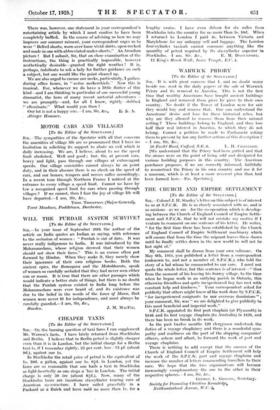THE CHURCH AND EMPIRE SETTLEMENT
[To the Editor of the SeEcT.vrott.] SIR,—Colonel J. IL Stanley's letter on this subject is of interest to us at S.P.C.K. He is so closely associated with us, and is so anxious--as we are —for the co-operation which is develop- ing between the Church of England Council of Empire Settle. ment and S.P.C.K. that he will not mistake my motive if I venture to comment on one sentence of his letter. He writes, " for the first time there has been established by the Church of England Council of Empire Settlement machinery which will ensure that from the time the migrant leaves these shores until he finally settles down in the new world he will not be last sight of."
My comment shall be drawn from your own columns. On May 6th, 1911, you published a letter from a correspondent (unknown to, and not a member of, S.P.C.K.), who told the story of a lad whom he commended to our care. I must not quote the whole letter, but this sentence is of interest—" thus from the moment of his leaving his Surrey village, to the time when he began work in an outlying parish in Ontario, this otherwise friendless and quite inexperienced boy has met with constant help and kindness." Your correspondent asked for publicity that others might know of the work done by S.P.C.K. "for inexperienced emigrants to our overseas dominions " ; your comment, Sir, was " we are delighted to give publicity to this most beneficial and imperial work."
S.P.C.K. appointed its first port chaplain (at Plymouth) in 1846 and its first voyage chaplain (to Australia) in 1850, and there has been no break in its work.
In the pist twelve months 120 clergymen undertook the duties of a voyage chaplaincy and there is a wonderful sym- pathy and readiness on the part of the shipping companies' officers, ashore and afloat, to forward the work of port and voyage chaplains.
There is nothing to add except that the success of the Church of England Council of Empire Settlement will help the work of the S.P.C.K. port and voyage chaplains and increase the number of letters commending travellers to their care. We hope that the two organizations will become increasingly complementary the one to the other in their respective spheres.—I am, Sir, &c., GEORGE L. GOSLING, Secretary.
Society for Promoting Christian Knowledge,
Northumberland Avenue, W.C.


















































 Previous page
Previous page